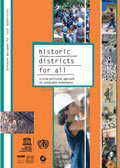| |
 |
 |
|
 |
 |
|
 |
 |
|
 |
| Historic Districts for All: A Social and Human Approach for Sustainable revitalization |
 |
| Published for a training session scheduled during World Urban Forum IV (Nanjing, China, 3-6 November 2008), this brochure, designed for local authorities, will help them become aware of the role of political will, of the importance of preserving tangible and intangible heritage and of enhancing cultural diversity, and above all, to have a better understanding of the importance of building new forms of social cohesion in cities. |
 |
 Read this brochure [PDF] Read this brochure [PDF]
For over a decade, the Social and Human Sciences Sector of UNESCO has been studying cities as “arenas of accelerated social transformations”. At the Second United Nations Conference on Human Settlements, which took place in Istanbul in 1996 (HABITAT II), UNESCO organized a round table on “Democracy and citizenship in the city of the twenty-first century”.
Since then, the Management of Social Transformations Programme, in cooperation with all UNESCO Sectors, has carried out several international comparative research projects to draw attention to the different components of inclusive cities in the world. “Small historical coastal cities”, “Old Beijing”, “Rehabilitation of Quito’s historic centre” and “Social sustainability of historic districts” are just four of these projects.
From HABITAT II in 1996 to the international seminars UNESCO organized in Beijing in January 2007, in Hué with the AIMF (International Association of French-speaking Mayors) in October 2007, and with UN-HABITAT in Seville in May 2008 on “balanced urbanization for social cohesion, economic development and heritage conservation”, UNESCO’s Social and Human Sciences Sector identified major indicators and parameters for strengthening social capital and cohesion in historic districts. These findings together with UN-HABITAT’s best practices formed the basis for this brochure, designed for local authorities, to highlight public policies and practices that enable social sustainability in historic districts.
In his 1933 speech to the 4th International Congress of Modern Architecture, held in Athens, Fernand Léger said: “there are some essential qualities to which the average person is attached and which he insists on having. If you destroy those qualities, then you have to replace them.
The problem is an essentially human one. Put your plans back in your pocket, go out to the street and listen to the people breathe; you have to be in touch with them, steep yourself in the raw material, and walk in the same mud and the same dust…”.
We sincerely hope that following the training session scheduled during World Urban Forum IV, to be held in Nanjing, China, from 3 to 6 November 2008, this brochure, together with the Manual for City Professionals, should become a useful tool. Indeed, this brochure should help municipalities become aware of the role of political will, of the importance of preserving tangible and intangible heritage and of enhancing cultural diversity, and above all, to have a better understanding of the importance of building new forms of social cohesion in cities where people must once again be placed at the centre of urban projects and a balance must be sought between economic competitiveness and harmonious development.
Related Links
|
|
|
| Author(s) |
UNESCO |
| Publication Date |
11-09-2008 |
| Source |
UNESCO |
|
|
|
|
|
|
|
 |
 |
 Email this page Email this page  Printable version Printable version
|
 |
|
|


